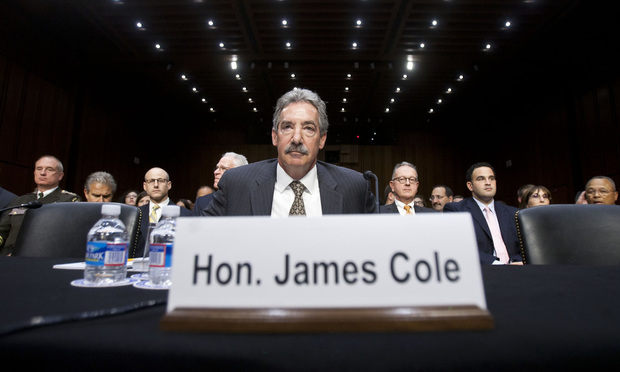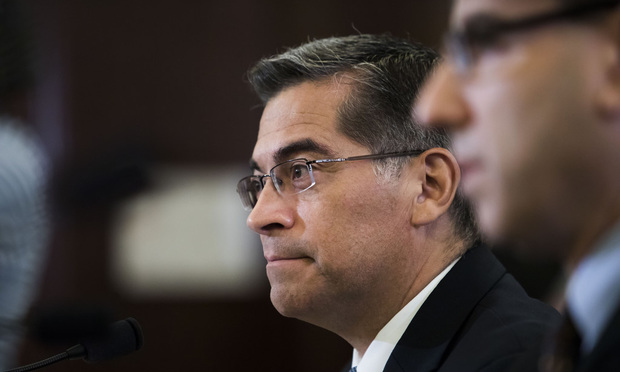James Cole's Marijuana Memo Just Got Revoked. Here's What He Thinks About That.
Cole, now a Sidley Austin partner, said he thought his namesake Justice Department memo outlined "a valid policy and was moving things in the right direction."
January 04, 2018 at 09:13 PM
5 minute read
The original version of this story was published on The Recorder
 James Cole, former deputy attorney general, testifies in 2013. Credit: Diego M. Radzinschi / ALM
James Cole, former deputy attorney general, testifies in 2013. Credit: Diego M. Radzinschi / ALM
The chief architect of Obama-era policies that largely shielded marijuana-legal states from heightened federal scrutiny said the decision by U.S. Attorney General Jeff Sessions to rescind that guidance will create uncertainty in an industry craving stability.
James Cole, now a partner at Sidley Austin in Washington, was the deputy attorney general in 2013 who wrote the guidance—known widely as the Cole memo—that told U.S. attorneys to focus on drug cartels and cross-border trafficking, not marijuana outlets complying with state regulatory schemes.
NY Lawmakers Ask Congress to Pass Marijuana Law Following Sessions Pot Reversal
Sessions revoked that document, calling it “unnecessary” and telling prosecutors to consider a broader, less specific range of “relevant considerations” when deciding whether to charge marijuana crimes.
Cole, in an interview with The Recorder on Thursday, said he thought his namesake memo outlined “a valid policy and was moving things in the right direction.” Twenty-nine states and the District of Columbia now allow medical or recreational use of marijuana or both. Many state regulatory schemes, including California's, focus on compliance with Cole memo tenets.
The Justice Department's rescission of the Cole memo purports to shift more prosecutorial discretion to U.S. attorneys, a move that could lead to starkly different marijuana policies among states and even within states that have multiple federal districts.
In districts where marijuana is legal—such as California's four districts—”there may be a certain level of sophistication and understanding of what their constituents want. That can influence prosecution priorities,” Cole said.
But any predictions are hazy given that President Trump has yet to nominate dozens of U.S. attorney candidates.
The office of McGregor Scott, the U.S. attorney for California's 34-county Eastern District, said in a statement Thursday that prosecutors will evaluate federal marijuana laws “in accordance with our district's federal law enforcement priorities and resources.” The statement continued: “We will continue our long-standing efforts to assess and address the unique threats and challenges facing our district together with our state, local and federal law enforcement partners.”
California leaders lambaste U.S. Justice Department
What happens in the coming months,”depends on whether a prosecutor brings a marijuana case that's outside the former policy,” Cole said. “It will make people nervous.”
Sessions' actions Thursday generated an avalanche of criticism from leaders of marijuana-legal states. Colorado Republican Sen. Cory Gardner said in a tweet that the attorney general had “trampled on the will of the voters in CO and other states.” Gardner threatened to hold up Trump's Justice Department nominees if Sessions does not allow states to make their own determination on the legality of marijuana.
Lori Ajax, the head of California's Bureau of Cannabis Control, said the state is moving forward with its fledgling system of licensing recreational retailers, growers and distributors. California on Jan. 1 launched its recreational rules.
“We expect the federal government to respect the rights of states and the votes of millions of people across America and if they won't, Congress should act,” Ajax said in a statement.
 California Attorney General Xavier Becerra.
California Attorney General Xavier Becerra.California Attorney General Xavier Becerra, who has criticized Sessions's views on marijuana, said his office intends “to vigorously enforce our state's laws and protect our state's interests.” Becerra, like other Democratic attorneys general, has sued the Trump administration over numerous regulatory actions in the past year.
“In California, we decided it was best to regulate, not criminalize, cannabis,” Becerra said. “Unlike others, we embrace, not fear, change.”
Omar Figueroa, a Sonoma County cannabis attorney, said Sessions's actions will foster anxiety throughout the industry.
Investors will be more hesitant to put their money cannabis operations now, he said, and banks—already wary about marijuana—will be even less likely to serve cannabis-related businesses now. Obama-era U.S. Treasury Department guidance for banks that choose to handle marijuana-generated money referenced the Cole memo that Sessions rescinded.
“This disrupts the peace of mind of people in the industry,” Figueroa said. “It's like a rug has been pulled out from underneath them.”
Cole, a 17-year veteran of the Justice Department, said he believes it's time for political action. “This is, I think, an area that really screams out for Congress to bring some clarity,” he said.
Read more:
Q&A: Former DOJ Attorney Dissects AG Sessions' Marijuana Memo
Cannabis-Industry Lawyer Raises Questions After His Bank Terminates Account
Cannabis Law Practices Brace for Impact of Sessions Memo
IRS Power Is Challenged in Marijuana Dispensary's Supreme Court Petition
We Asked 4 Marijuana-Industry Lawyers 4 Questions. Here's What They Said
Charges Against San Diego Cannabis Attorney Alarm Industry Lawyers
This content has been archived. It is available through our partners, LexisNexis® and Bloomberg Law.
To view this content, please continue to their sites.
Not a Lexis Subscriber?
Subscribe Now
Not a Bloomberg Law Subscriber?
Subscribe Now
NOT FOR REPRINT
© 2025 ALM Global, LLC, All Rights Reserved. Request academic re-use from www.copyright.com. All other uses, submit a request to [email protected]. For more information visit Asset & Logo Licensing.
You Might Like
View All
Longtime Purdue GC Accused of Drunken Driving Hires Big-Name Defense Attorney
3 minute read

'Careless Execution' of Presidential Pardons Freed Convicted Sex Trafficker, US Judge Laments

'You Became a Corrupt Politician': Judge Gives Prison Time to Former Sen. Robert Menendez for Corruption Conviction
5 minute readTrending Stories
- 1Public Notices/Calendars
- 2Wednesday Newspaper
- 3Decision of the Day: Qui Tam Relators Do Not Plausibly Claim Firm Avoided Tax Obligations Through Visa Applications, Circuit Finds
- 4Judicial Ethics Opinion 24-116
- 5Big Law Firms Sheppard Mullin, Morgan Lewis and Baker Botts Add Partners in Houston
Who Got The Work
J. Brugh Lower of Gibbons has entered an appearance for industrial equipment supplier Devco Corporation in a pending trademark infringement lawsuit. The suit, accusing the defendant of selling knock-off Graco products, was filed Dec. 18 in New Jersey District Court by Rivkin Radler on behalf of Graco Inc. and Graco Minnesota. The case, assigned to U.S. District Judge Zahid N. Quraishi, is 3:24-cv-11294, Graco Inc. et al v. Devco Corporation.
Who Got The Work
Rebecca Maller-Stein and Kent A. Yalowitz of Arnold & Porter Kaye Scholer have entered their appearances for Hanaco Venture Capital and its executives, Lior Prosor and David Frankel, in a pending securities lawsuit. The action, filed on Dec. 24 in New York Southern District Court by Zell, Aron & Co. on behalf of Goldeneye Advisors, accuses the defendants of negligently and fraudulently managing the plaintiff's $1 million investment. The case, assigned to U.S. District Judge Vernon S. Broderick, is 1:24-cv-09918, Goldeneye Advisors, LLC v. Hanaco Venture Capital, Ltd. et al.
Who Got The Work
Attorneys from A&O Shearman has stepped in as defense counsel for Toronto-Dominion Bank and other defendants in a pending securities class action. The suit, filed Dec. 11 in New York Southern District Court by Bleichmar Fonti & Auld, accuses the defendants of concealing the bank's 'pervasive' deficiencies in regards to its compliance with the Bank Secrecy Act and the quality of its anti-money laundering controls. The case, assigned to U.S. District Judge Arun Subramanian, is 1:24-cv-09445, Gonzalez v. The Toronto-Dominion Bank et al.
Who Got The Work
Crown Castle International, a Pennsylvania company providing shared communications infrastructure, has turned to Luke D. Wolf of Gordon Rees Scully Mansukhani to fend off a pending breach-of-contract lawsuit. The court action, filed Nov. 25 in Michigan Eastern District Court by Hooper Hathaway PC on behalf of The Town Residences LLC, accuses Crown Castle of failing to transfer approximately $30,000 in utility payments from T-Mobile in breach of a roof-top lease and assignment agreement. The case, assigned to U.S. District Judge Susan K. Declercq, is 2:24-cv-13131, The Town Residences LLC v. T-Mobile US, Inc. et al.
Who Got The Work
Wilfred P. Coronato and Daniel M. Schwartz of McCarter & English have stepped in as defense counsel to Electrolux Home Products Inc. in a pending product liability lawsuit. The court action, filed Nov. 26 in New York Eastern District Court by Poulos Lopiccolo PC and Nagel Rice LLP on behalf of David Stern, alleges that the defendant's refrigerators’ drawers and shelving repeatedly break and fall apart within months after purchase. The case, assigned to U.S. District Judge Joan M. Azrack, is 2:24-cv-08204, Stern v. Electrolux Home Products, Inc.
Featured Firms
Law Offices of Gary Martin Hays & Associates, P.C.
(470) 294-1674
Law Offices of Mark E. Salomone
(857) 444-6468
Smith & Hassler
(713) 739-1250








